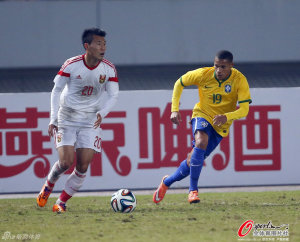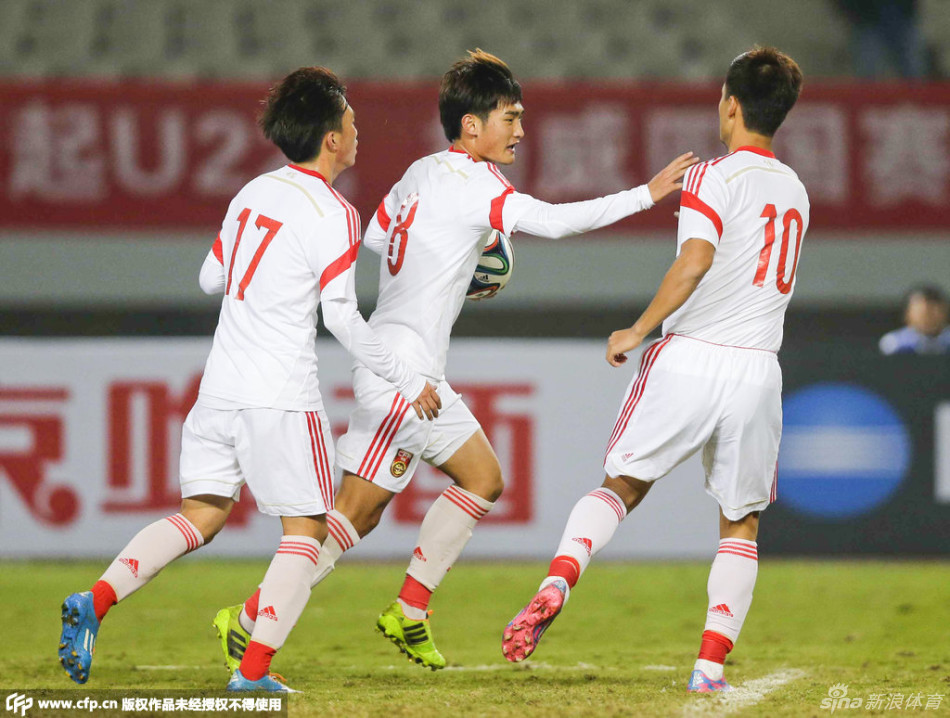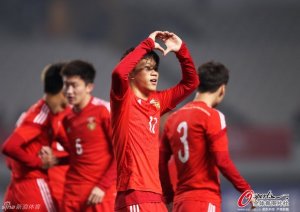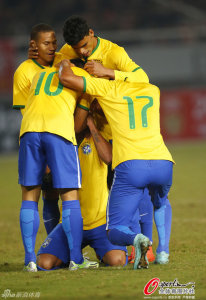The Chinese Olympic football team put on an encouraging second half display before eventually falling 2-1 to a Brazilian team full of players based in Europe’s biggest leagues. The game was the culmination of a four team tournament played in Wuhan which also featured Australia and recently crowned Asian champions South Korea. The mini-league format saw the teams play a gruelling three games in five days and prior results meant that this game was effectively the final.
China’s opening contest against South Korea ended 1-1 thanks to Shandong Luneng’s Wu Xinghan whose 53rd minute strike cancelled out a late first half goal from the Koreans and gave the home side an impressive result against the team who won last month’s Asian Games tournament in Inchon.
Just two days later, the young Chinese side ran out 3-1 winners in an open game against their Australian counterparts. Hangzhou Greentown’s Xie Pengfei opened the scoring on ten minutes before the Australian’s equalised midway through the first half. However, in the 56th minute, Wu Xinghan again found the net and Guangzhou R&F’s Chang Feiya added a third eighteen minutes later. Fortunately for Guoao, the young Socceroos were unable to capitalise on numerous defensive errors and their tally remained at one.
For their part, the Brazilians had unexpectedly drawn their opening game 2-2 with the Australians before trouncing South Korea 3-0 in their second match. An inferior goal difference set up a scenario in which China had to beat the South Americans to win the tournament but it was the team in yellow who dominated the first half.
That the Chinese were unable to handle their opponents in the opening 45 minutes was perhaps no surprise considering the calibre of those facing them. With the exception of the goalkeeper, Brazil’s entire starting eleven was drawn from the top flights of Germany, Italy, Spain, Portugal or France. For example, Lucas Evangalista, who opened the scoring after 20 minutes, plays his football in Serie A for Udinese while Wellington Silva, who added a second just before half time, is currently on loan to La Liga outfit Almeria from Premier League giants Arsenal.
The Chinese side boasted four changes from the side that had just beaten Australia, and this showed in the first half as they struggled to find any rhythm. The fullbacks had a difficult time dealing with Brazil’s pacy wingers and right back Yang Ting had a particularly torrid evening. He was overwhelmed in the first half by Ryder Matos – currently on loan from FIorentina to newly promoted La Liga side Cordoba – and was responsible for the first goal when he dallied on the ball and let rampaging Marseilles centre back Doria dispossess him to set up the opener.
However, it’s unfair to pick on Yang specifically, and the fact that the youngster was one of four player brought off at half time illustrates that he was not the only one struggling to cope. What is apparent is that Yang found it understandably tough to go from taking part in a failing China League One relegation battle with Chengdu, to competing against players who ply their trade in Europe’s top leagues. This is perhaps an indication of the comparative lack of depth amongst China’s younger generation and the importance of playing relatively high level football on a regular basis.
Fortunately for China, the halftime introduction of Wu Xinghan and, in particular, Guangzhou Evergrande midfielder Liao Lisheng proved decisive in turning the game in their favour. Fresh from a goal in each of his previous games, Wu looked lively and Liao, who has impressed with the Super League champions this season, both won and converted the penalty which brought his nation back into the game. In the 66th minute, Liao was brought down by a reckless kick at the ball from Doria and dusted himself off to cut the gap to just a single goal. It was a deficit that China were unable to overcome but capped a half in which they looked like equals to, if not betters of, their thoroughbred opponents.

Learning Through Experience: Portugal based midfielder Li Yuanyi picks out a pass as Arsenal loanee Wellington Silva looks on
This game clearly shows that China’s next generation is some way off taking its place among the elites of world football, but the results in the first two games demonstrate that, regionally speaking, the gap may be narrowing. The Olympic qualification campaign starts soon and reaching the 2016 games in Rio is a target taken more seriously in China than many other nations – especially those in Europe. A win and a draw against Asian powerhouses make qualification seem possible, while a worthy second half display against a top class team undergoing serious preparation to win their home tournament shows China are capable of being competitive should they make it to South America.
Tournament Results:
Friday November 14th
Brazil U22 2-2 Australia U22
China U22 1-1 South Korea
Sunday November 16th
Brazil U22 3-0 South Korea U22
China U22 3-1 Australia U22
Tuesday November 18th
Australia U22 1-0 South Korea U22
Brazil U22 2-1 China U22


